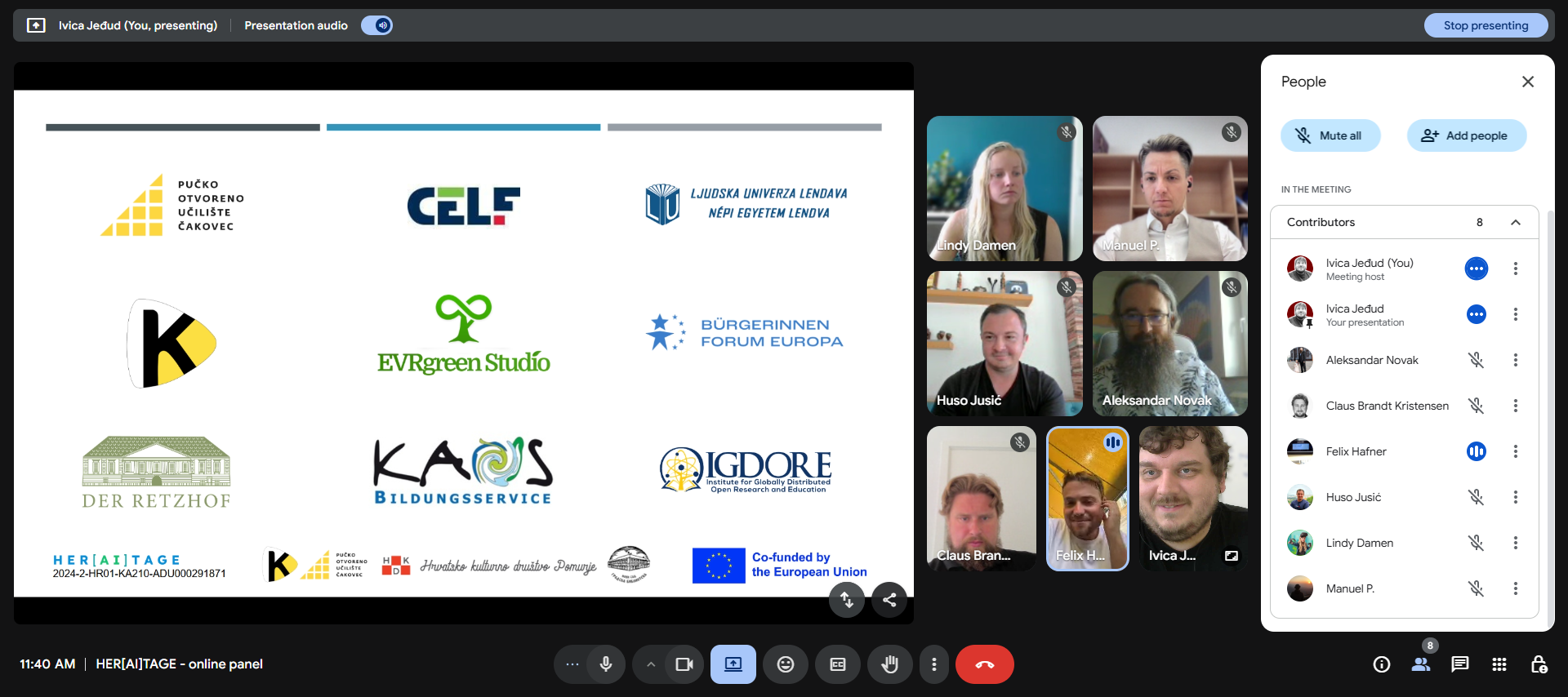As part of the Erasmus+ project HER[AI]TAGE: Preserving Intangible Cultural Heritage and Environmental Knowledge Through AI Technology, an insightful online panel discussion was held today, bringing together a diverse group of experts from across Europe. The panel’s aim was to foster a rich dialogue on the intersection of artificial intelligence, shared cultural heritage and environmental sustainability, exploring how new technologies can be harnessed for social good, particularly within the field of adult education.
The HER[AI]TAGE project is a collaboration between partners from Croatia (Kultivator, the applicant, and POU Čakovec), Slovenia (Hrvaško kulturno društvo Pomurje) and Serbia (Gradska biblioteka u Novom Sadu). The project seeks to preserve the ecological knowledge and intangible cultural heritage of its senior citizens. HER[AI]TAGE aims to collect more than 60 stories from seniors on their environmental knowledge and intangible cultural heritage across the three countries. The project will use AI to transcribe, illustrate and create audio versions of these stories, which will then be published in a digital database and as an interactive e-book. Furthermore, HER[AI]TAGE will develop three MOOC (Massive Open Online Course) crash courses on the ethical use of AI in adult education, cultural heritage and environmental education.
The panel featured a distinguished lineup of contributors, each offering a unique perspective on the topic:
- Manuel Pascuttini from KAOS Bildungsservice in Austria.
- Felix Michael Hafner representing BürgerInnen Forum Europa and Bildungshaus Retzhof from Austria.
- Claus Brandt Kristensen from CELF – Centre for Vocational Education Lolland Falster in Denmark.
- Lindy Damen from EVRgreen Studio in the Netherlands.
- Huso Jusić from the People’s University Lendava in Slovenia.
- Aleksandar Novak from the Kultivator Association for the media promotion of culture, heritage, tradition and art in Croatia.
- Ivica Jeđud from Pučko otvoreno učilište Čakovec in Croatia and the Institute for Globally Distributed Open Research and Education in Sweden.
The panellists’ discussion brought forth several key conclusions. The conversation addressed the rapid integration of AI into daily life and its potential to enhance education through personalised learning paths. However, panellists also voiced significant concerns that AI could potentially deepen the digital divide for older learners and those with fewer technical skills, highlighting a critical challenge for the future of adult education. All panellists agreed that the introduction of generative AI tools marks a “paradigm shift” in how we approach learning, teaching and education in general.
The conversation also focused on the dual role of AI in an age of misinformation. Panellists noted that while AI can be a powerful tool for combating disinformation and promoting civic engagement, its effective use hinges on developing widespread “AI literacy” through quality adult education programmes. This educational need extends to vocational training, where the discussion explored how AI can be integrated to equip students and learners for a technologically evolving job market. Practical examples were presented, such as using AI as a “didactical tool” for preparing class materials and lesson plans, and even for helping to increase reflectiveness through chatbot implementations. A notable point was that modern tools like AI could also aid in preserving traditional crafts through digital archives and AI-assisted learning methods, thereby preserving the traditional knowledge of the elderly for future generations.
The panellists also delved into how AI, serious games and immersive technologies can promote environmental action and preserve our “environmental heritage”. In this context, AI, through its generative capabilities, can be viewed as a valuable tool not just for providing the point of view of someone else, but also of another time. This creates a bridge between the past and present that points towards potential future scenarios. The panellists underscored the critical need to navigate ethical pitfalls to ensure these technologies protect, rather than inadvertently harm, our environment and culture. This led to a broader conversation on inclusivity, where AI was identified as a valuable tool for bridging language barriers in multicultural regions, making local cultural heritage more accessible to all.
The discussion emphasised that both learners and educators must acquire the essential skills to use generative AI tools ethically and effectively. Critical thinking crystallised as an imperative skill in this process. Panellists affirmed that a critical approach to content presented by generative AI tools is mandatory, as these tools should be used to enhance the learning process, not replace it.
Looking ahead, the panellists agreed on the necessity of maintaining a “human-in-the-loop” approach, ensuring AI supports rather than replaces the essential human elements of teaching and learning. The panellists stressed that although AI may seem powerful, it will never be able to fully replace another person. The insightful contributions from this panel discussion will be incorporated into the project’s upcoming results, enriching its educational content and guiding the responsible use of AI.
For more information on the project, please visit https://her-ai-tage.pou-cakovec.hr/.

Funded by the European Union. Views and opinions expressed are however those of the author(s) only and do not necessarily reflect those of the European Union or Agency for Mobility and EU Programmes (AMPEU). Neither the European Union nor the granting authority can be held responsible for them.

